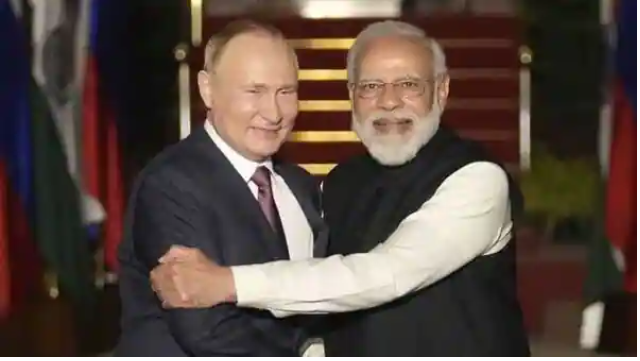Photo: AP
Published by City University of London. 6 June 2022
India’s refusal to outrightly condemn Russia for invading Ukraine is driven by its own interests and not by the nobler ideals which imbued the non-aligned movement of the 1960s and 1970s.
Thick in the midst of its bloody invasion of Ukraine, Russia’s Foreign Minister Sergei Lavrov found time to visit India in early April 2022. Lavrov met India’s Prime Minister Narendra Modi and foreign minister S. Jaishankar and praised India for not taking a “one-sided” view of the war and considering “the entirety of facts”.
Lavrov’s visit coincided with visits of UK Foreign Secretary Liz Truss and US Deputy National Security Advisor Daleep Singh to Delhi. Truss was in India to urge democracies to counter Russia’s invasion of Ukraine, especially by reducing dependence on Russian oil imports. Meanwhile, Singh said that countries trying to circumvent sanctions on Russia would face consequences.
Both the West and Russia share close ties with India and are keen to enlist its support on the war in Ukraine. India on its part has refrained from directly condemning Russia, ignored sanctions and stepped up purchases of discounted Russian oil.
Observers of India’s foreign relations wonder if India’s explicit alignment with Russia and pushback against the West marks a new direction in India’s foreign policy. But on the contrary, India’s foreign policy choices are a continuation of the muscular and strongman policies set in motion by the Narendra Modi government since it came to power in 2014.
Electoral manifestoes of Bharatiya Janata Party (BJP) to which Narendra Modi belongs, promise a major role for India in shaping the global agenda. While this is a positive goal for India, in practice the effects have not always been benign. For example, in South Asia, where India is the most dominant country, neighbours like Nepal and Bhutan— while economically dependent on India — also resent its interference.
India’s ‘unofficial’ economic blockade of fuel and supplies to Nepal in 2015, because it did not approve of its new Constitution, triggered deep resentment in the country. Nepal accused the Indian government of the blockade, which the latter denied.
Bhutan too is uncomfortable with India’s influence. This was evident during the 2017 stand-off between India and China over the Doklam Pass which is contested territory between Bhutan and China and located at the tri-junction of the three countries. Bhutan was not pleased with India’s intervention.
India which was earlier known for sheltering refugees has subjected Rohingyas fleeing genocide in Myanmar to discrimination, detention and deportation. Though India hosts approximately 40,000 Rohingyas, there have been multiple instances of refugee camps being set on fire. BJP leaders have labelled Rohingyas as terrorists and demanded that they be expelled from the country. Interestingly, even as the Myanmar government stands accused of genocide, the country was the largest recipient of Indian military exports from 2017-2021.
Another visible transformation in India’s foreign policy since the Modi government took power is its proximity to Israel and diminishing support for Palestine. Modi became the first Indian Prime Minister to visit Israel in 2017 and India was the top recipient of Israeli military exports from 2017-2021. The Indian government is also reported to have purchased Israeli Pegasus spyware, and used it to spy on journalists, politicians, lawyers, students, activists and bureaucrats —a charge that it is yet to confirm or deny.
Even as the Modi government flexes muscle internationally, it has been authoritarian domestically too; suppressing dissent and permitting right-wing vigilante groups to target Muslims and Christian minorities. Recent celebrations of the Hindu festival Ram Navami saw hate speech against Muslims and vandalism of their shops and properties. A Muslim majority neighbourhood of Delhi’s Jahangirpuri also witnessed an unprecedented demolition drive of their homes. When confronted with international criticism over its human rights record, amending citizenship laws or clamping down on major protests by farmers – India has been dismissive and defiant.
It is admittedly hard to ignore India because of its economy, population and powerful diaspora. It is a top supplier of vaccines and plays an important role in groupings such as the Quad.
Significantly, India is also the world’s largest importer of arms with Russia being a major supplier. Russian Foreign Minister Lavrov underlined India’s importance when he pointed out that Russia is a major foreign contractor for New Delhi.
But Russia is equally important to India, supporting the latter’s bid for a permanent UNSC seat, during the 1971 Bangladesh war and opposed sanctions on India for testing nuclear weapons in 1998. In not criticising Russia, India is not just returning favours but also protecting its interests which include imports of Russian arms and oil.
These actions cumulatively signal India’s continuing aggressive and muscular foreign policy, in line with the vision of its right-wing government whose authoritarian tendencies are increasingly evident, at home and abroad.
India’s refusal to side with the West should not be interpreted as a revival of its non-alignment policy which was imbued with ideals of anti-colonialism, anti-imperialism and Third World solidarity. Instead, realpolitik and hard realism drive India’s current decisions.
Read the original article: https://blogs.city.ac.uk/internationalsystemofpower/2022/06/06/indias-refusal-to-side-with-the-west-should-not-be-interpreted-as-a-revival-of-its-non-alignment-policy/

